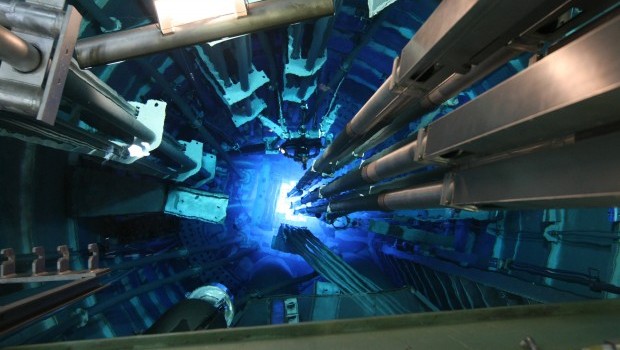The Obama administration’s line on Iran is that the United States is determined to stop the Islamic Republic from becoming a nuclear power and that “containment” is not an option.
However, after listening to the commentariat in Washington it becomes clear that, having run out of ideas about how to stop Tehran’s nuclear ambitions, Obama is tilting towards containment as the core of his Iran policy. Thus his problem is how to eat humble pie without appearing to do so. To help him on that front, a section of the commentariat has been deployed to furnish arguments in favor of containment.
The standard and most often cited argument is that no one has the stomach for military action to stop—let alone destroy—Iran’s nuclear project. War, as everyone knows, is a gamble with unforeseeable consequences. This is why Obama has used “targeted sanctions” as an alternative to military action. Although sanctions have not persuaded Iran to change course, they have made containment easier. A weakened adversary is easier to contain than one strengthened by a healthy economy.
The aim is to show that the choice the US is facing is between a full-scale invasion of Iran and doing nothing.
The argument to back that claim is simple. If a nation with the financial and technological resources to make a bomb decides to do so, no one can prevent it.
In the past half century, several nations have decided not to use their resources in pursuit of a nuclear arsenal. This includes Japan and Germany, both of which have the science and the money to build the bomb. Some other nations had a nuclear capability but decided to scrap it for their own reasons; among them were Argentina, Brazil, South Africa, Ukraine and Kazakhstan.
In Saddam Hussein’s Iraq and Bashar Al-Assad’s Syria, nuclear capabilities were bombed out of existence in the early stages of the conflicts.
In one case, Libya, the nuclear project was abandoned thanks to pressure and promises from the United States and the European Union.
Right now, eight nations have acknowledged nuclear arsenals. They are the United States, China, Russia, France, Britain, India, Pakistan and Israel. A ninth one, North Korea, has a burgeoning, although no less deadly, capability. North Korea is a glaring example of the failure of preemption in dealing with nations with nuclear ambitions.
Then we have a batch of 32 nations that have the money and the science needed to develop a nuclear arsenal but have never wanted to do so.
Initially signed by only 11 nations 45 years ago, the Nuclear Nonproliferation Treaty (NPT) now boasts the adherence of virtually all 194 members of the United Nations. However, the treaty has no mechanism to prevent a signatory from launching a nuclear project with military aims. A signatory could always cheat, as Iran is suspected of doing, or renounce the treaty as North Korea has done.
Having established that there is no easy way of stopping Iran’s nuclear ambitions, advocates of containment try to find arguments in favor of swallowing this bitter pill in exchange for the possible advantages of wooing Iran.
One argument that the lobby in Washington that wants to court Iran insists upon is that Iran could enable the US to deprive Russia of its ability to use oil and gas exports to the European Union as a means of exerting pressure on Western democracies.
Once Iran is “on board,” it could provide the shortest and most economical route for oil and gas pipelines from the Caspian Basin to the world markets. Such a development would also provide Western powers with an additional means of influencing China with its growing dependence on energy imports.
Translated into plain language, the hare-brained argument goes something like this: Let Iran, the avowed enemy of Western democracies, develop the bomb so that we could use it against Russia, a self-proclaimed adversary, and China, a putative rival.
The trouble is that for such a strategy to work Iran must be turned into an ally of Western democracies. But, if that were to happen, why would Iran need a nuclear arsenal and why would Western democracies worry about it having one?
The pro-Iran lobby is caught in a circular argument that makes little sense in real life.
Another argument is that Tehran’s Khomeinist regime, like the Kim-ist gang in Pyongyang, is developing a nuclear arsenal because it is afraid and needs reassurance. But what does that really mean? It means that in order for the other side to feel reassured and not afraid you must allow it to frighten you and deprive you of part of your reassurance. That is a recipe for sharing insecurity rather than fostering a system of mutual security. Once Iran, thanks to its bomb, no longer feels insecure, would it not be natural for its neighbors to start feeling insecure? We have another circular argument leading to an impasse.
Vice President Joe Biden says that “talks with Iran cannot go on indefinitely.” However, as long as a definite deadline is not fixed for these talks they could, and do, go on indefinitely.
Secretary of State John Kerry utters another banality: “Time is running out.” However, the only thing that is unlikely ever to run out is time, if only because there is always a day after tomorrow. What could run out is the relevance of any talks with Iran. Once the Khomeinist regime has obtained the means to produce a nuclear arsenal, there would be no point to the current talks—which are about preventing Iran from hitting that threshold.

Taheri knows Iran; he also knows the West. His analysis is one of the very few till now that seem to reveal the workings of the American mind on Iran.